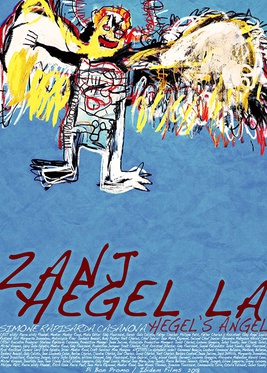
Jean Rouch was a French filmmaker and anthropologist.

Visual anthropology is a subfield of social anthropology that is concerned, in part, with the study and production of ethnographic photography, film and, since the mid-1990s, new media. More recently it has been used by historians of science and visual culture. Although sometimes wrongly conflated with ethnographic film, visual anthropology encompasses much more, including the anthropological study of all visual representations such as dance and other kinds of performance, museums and archiving, all visual arts, and the production and reception of mass media. Histories and analyses of representations from many cultures are part of visual anthropology: research topics include sandpaintings, tattoos, sculptures and reliefs, cave paintings, scrimshaw, jewelry, hieroglyphics, paintings and photographs. Also within the province of the subfield are studies of human vision, properties of media, the relationship of visual form and function, and applied, collaborative uses of visual representations.

Salvage ethnography is the recording of the practices and folklore of cultures threatened with extinction, including as a result of modernization and assimilation. It is generally associated with the American anthropologist Franz Boas; he and his students aimed to record vanishing Native American cultures. Since the 1960s, anthropologists have used the term as part of a critique of 19th-century ethnography and early modern anthropology.
Simone is a given name that may be used as a masculine or feminine name, depending on the language.

Jean-Pierre Bekolo is a Cameroon film director.

Docufiction is the cinematographic combination of documentary and fiction, this term often meaning narrative film. It is a film genre which attempts to capture reality such as it is and which simultaneously introduces unreal elements or fictional situations in narrative in order to strengthen the representation of reality using some kind of artistic expression.
Ethnofiction refers to a subfield of ethnography which produces works that introduce art, in the form of storytelling, "thick descriptions and conversational narratives", and even first-person autobiographical accounts, into peer-reviewed academic works.

An ethnographic film is a non-fiction film, often similar to a documentary film, historically shot by Western filmmakers and dealing with non-Western people, and sometimes associated with anthropology. Definitions of the term are not definitive. Some academics claim it is more documentary, less anthropology, while others think it rests somewhere between the fields of anthropology and documentary films.

Pour la suite du monde is a 1963 Canadian documentary film produced by the National Film Board of Canada and directed by Michel Brault, Marcel Carrière and Pierre Perrault. It is the first of Perrault's Isle-aux-Coudres Trilogy: Le règne du jour followed in 1967, Les voitures d'eau in 1968.

Mildred "Chick" Strand was an American experimental filmmaker, "a pioneer in blending avant-garde techniques with documentary". Chick Strand contributed to the movement of women's experimental cinema in the early 1960s–1970's. Strand's film making and directing approach incorporates personal elements from her own life experiences and societal forces and realities. The film Elasticity (1976) is an example of Strand's attempts at autobiographical work that also incorporates Strand's specific standpoint on certain social issues. Feminist issues and anthropological inquiries about the human condition are frequent themes in Strand's films. However, because Strand's films and work were often deeply personal and subjective, they were often rejected from male-dominated academic circles of anthropologists and critiqued for being non-academic works.

Bady Minck is a Luxembourgian filmmaker, film producer and artist.

Leviathan is a 2012 American documentary directed by Lucien Castaing-Taylor and Véréna Paravel of the Sensory Ethnography Lab at Harvard University. It is a work about the North American fishing industry. The film was acquired for U.S. distribution by The Cinema Guild. The film-makers used GoPro cameras and worked twenty-hour shifts during the shooting of the film.
Non-narrative film is an aesthetic of cinematic film that does not narrate, or relate "an event, whether real or imaginary". It is usually a form of art film or experimental film, not made for mass entertainment.
David Monacchi is an Italian sound artist, researcher and eco-acoustic composer, best known for his multidisciplinary project Fragments of Extinction, patented periphonic device, the Eco-Acoustic Theatre, and award-winning music and sound-art installations.

The Creation of Meaning is a 2014 experimental film directed by Simone Rapisarda Casanova.
The Strawberry Tree is a 2011 experimental film directed by Simone Rapisarda Casanova. The film premiered at the 2011 Locarno Film Festival.

Hegel's Angel is a 2018 experimental film directed by Simone Rapisarda Casanova.
Eduardo "Teddy" Williams is an Argentine film director. He first studied at Universidad del Cine in Buenos Aires, and then in Fresnoy, France, under the tutorship of Portuguese director Miguel Gomes. Williams works within an avant-garde/experimental tradition, and has made the feature film The Human Surge, in addition to a number of short films. His works have been presented at film festivals such as Cannes, Locarno, Toronto and New York. He frequently works with his partner and fellow countryman actor Nahuel Pérez Biscayart.

Laura Huertas Millán is a French artist and filmmaker. Her works have been presented in various cinema festivals, including the IFFR, FIDMarseille, Cinéma du Réel, Berlinale, and Locarno Film Festival. Widely shown in the contemporary art world, her artworks are part of public and private collections in Europe and the Americas.










